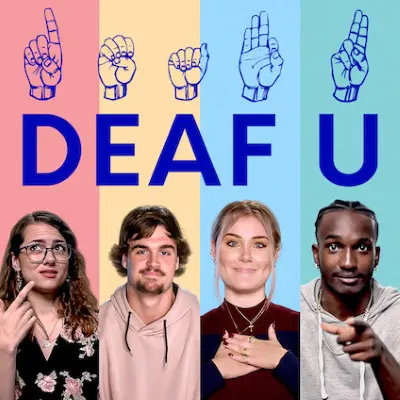Netflix's Deaf U is more satisfying for being a huge leap in deaf representation onscreen
-

The eight-episode reality show from deaf activist Nyle DiMarco never quite delivers on "emotional impact or entertainment value," says Inkoo Kang. "The relative thinness of the characterizations — and the emphasis on the cast’s not-that-interesting love lives — makes starker the other shortcomings in the series." But, she says, Deaf U does offer portrayals of deaf people that are rarely shown. "The show is a snapshot of the diversity among the hard of hearing: Here are deaf influencers, deaf party animals, deaf beer brewers, deaf poetry slammers, deaf f*ckboys, deaf Southern Baptists, deaf reality-show villains," says Kang. "Even more intriguing are the social hierarchies (seemingly informed by race and class, though that’s never explicitly said) that can make the small community of the hard of hearing feel claustrophobic, especially if its members are not part of 'the Elite' — mean girls who grew up together in the same deaf-centric town, attended the same deaf-centric schools and don’t particularly care for anyone who doesn’t share their background."
ALSO:
- Why is Deaf U being marketed as a "docusoap"?: "The series, which I inhaled with the fistfuls-of-popcorn fervor of a desperate person enjoying a break from current events, follows several young people as they talk about deaf culture, the pleasure and tension of dating and friendship, and the specific challenges of Gallaudet," says Kathryn VanArendonk. "It’s pop-y and fun, but it’s also doing some fascinating sociological heavy lifting. As the series weaves in and out of journalistic observation and frankly voyeuristic, messy stories about cliques, sex, and snobbery, I found myself trying to pin down exactly what a docusoap is. It’s pretty easy to pick out the two poles. On the documentary side, there are parts of Deaf U that feel like deep-dive explainers — and I mean that in the best possible sense — about the complicated and rich internecine cultural divides inside deaf culture. Like many of the best documentaries, they use personal stories as entry points for bigger, more abstract ideas...The soap side is just as distinctive and identifiable as the documentary side....Deaf U is interested in deaf culture, but it’s equally as interested — maybe even more interested — in who’s sleeping with whom, what college kid has a childhood friendship that seems to be souring, who’s jealous, who’s horny, who’s recently realized they’re gay. It’s a dramatic, gossipy show. If Deaf U were a person, it’d see you walk into a party and wave you over so it could tell you all the dirt."
- What Deaf U does so skillfully is lift the veil and dispel notions about the deaf community: "It examines the way deaf people speak, and how the hierarchy changes if you can speak," says Kristen Lopez, adding: "The biggest issue that can be found with Deaf U is almost the complete absence of a racial discussion...Disability representation in media is still heavily a white man’s world, and while Deaf U gives us far more of a Black deaf experience here than I’ve ever seen, the fact that none of them are asked about racism at school is troubling."
- The raw honesty and vulnerability from Deaf U's cast of 20-something college students is remarkable: "By following students and friends at Gallaudet University in Washington, D.C., the show lives somewhere between The Real World, Laguna Beach: The Real Orange County, and The Real Housewives," says Andy Dehnart. "It’s produced, yes: characters find their way to locations that are incredibly cinematic (the Lincoln Memorial at night) or suspiciously empty (the university’s swimming pool). They’re usually paired off and probably prompted to have conversations for the cameras. What’s remarkable is how none of their interaction comes off as performance, and how honest and vulnerable the cast members are, both in the moments when we’re just living their lives with them, and when they’re in confessional interviews, answering producers’ questions."
- Nyle DiMarco made Deaf U because he recalls being known as "The Deaf Guy" -- even after winning America's Next Top Model and Dancing with the Stars: “No one really took the time to really get to know me and who I really was—things I liked, my interests,” he explains. “There were no real layers that were explored. I just, you know, was kind of one-dimensional in that regard.”
- DiMarco wanted to prove deaf culture exists: “One of my biggest struggles in the last five years in the industry is that people don’t believe me when I tell them deaf culture exists,” DiMarco told TheWrap via an American Sign Language interpreter. “But now I can tell them, watch the show.”
TOPICS: Deaf U, Netflix, Disabilities and TV, Reality TV
More Deaf U on Primetimer:- Ted Lasso earns three Television Critics Association Awards, including Program of the Year
- Deaf people push for better representation on TV, including more of a focus on those who don't use sign language
- Deaf U shouldn't have to represent all deaf people
- Netflix's Deaf U Is More Than a Party-School Reality Show With Hand Gestures
